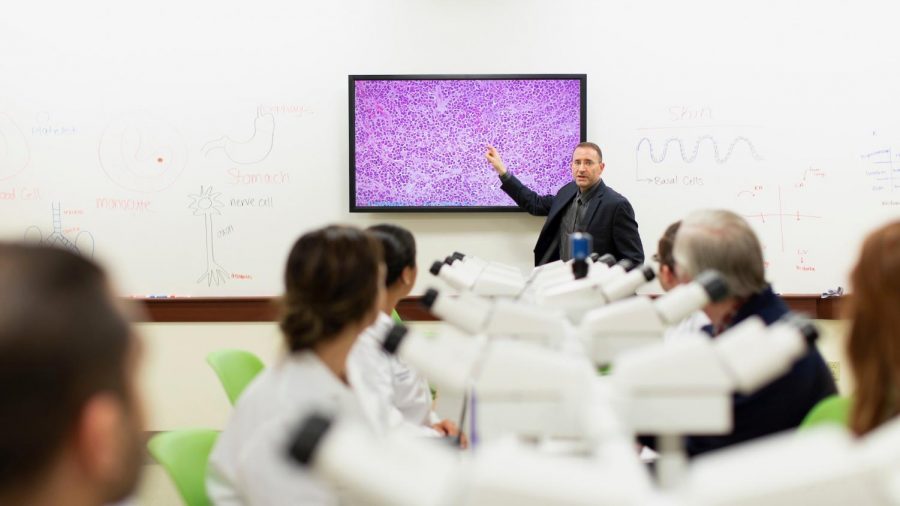COVID-19 impacts Quinnipiac faculty and staff salaries
March 25, 2020
Many companies around the world have decreased employee’s salaries in wake of COVID-19.
“The pandemic is also impacting the finances of colleges and universities, including Quinnipiac,” President Judy Olian said in an email sent to faculty and staff on Monday. “The far-reaching disruptions caused by COVID-19 have resulted in significant additional expenses for our university and lost revenues from programs and events that were canceled. In addition, the pandemic creates uncertainty in our future enrollment projections.”
Olian outlined temporary salary reductions that will begin on April 1, 2020 and continue through June 30. Faculty and staff members earning less than $50,000 per year will have a 3% reduction in pay, and all others will have a 5% reduction. Olian and other members of the Management Committee will have larger salary reductions that were not specified in the email.
“Insofar as possible, our intent is to minimize the financial impact of the crisis on the faculty and staff of Quinnipiac, and especially on those who earn the least,” Olian said.
Associate Professor and Chair of the Department of Journalism Margarita Diaz is not pleased with the pay reduction but understands the reasoning behind it.
“I’m not thrilled, obviously, but I know that in these extraordinary times, these measures are sometimes necessary,” Diaz said.
Other things to note include that there will not be any merit increases in base salary for the 2020-2021 academic year, but faculty whose promotions were approved this school year will still be awarded base salary increases.
The deans and unit heads submitted adjusted budget plans to reflect important expenditures for the remainder of the 2020 fiscal year. These savings were considered when the temporary salary reduction amounts were determined. The university also plans to slow the speed in which it invests in upcoming capital programs to assist with decreasing its expenses.
“These decisions were reached after extensive deliberations of the Management Committee, exploration of alternatives, and consultation with experts, Trustees, Faculty Senate leadership and members of our community,” Olian said. “Undoubtedly, we will need to consider additional financial measures as we absorb the continuing impact of the pandemic around the world, in our country, and specifically on QU.”
Olian stressed the importance of a strong enrollment for the summer and fall programs being offered to decrease the severity of the impact on the future of Quinnipiac’s finances for personnel and programs.
“It is absolutely vital that we each devote significant energy and creativity to augment these student cohorts, for example, by extending or launching creative online course offerings,” Olian said.
Quinnipiac made the decision to transition courses to be taught fully online for the remainder of the semester on Tuesday, March 10 in response to the outbreak of COVID-19. The original email said that students would be allowed to return to campus on Sunday, March 22; however, this quickly changed when the university decided to close all housing on Sunday, March 15.
Faculty members were instructed to transition their courses to be taught online over spring break. Virtual classes began on Wednesday, March 18.
“The delivery method and the experience are different, but it’s still the same faculty and we’re doing an amazing job,” Diaz said. “People are being creative, resourceful and passionate about adapting their classes. I hope students and others recognize that.”
Diaz noted that it’s been an “exhausting” transition.
Olian also said in her email that working remotely makes this time period more difficult.
“I hope that continued decision-making transparency and my promise to communicate with you regularly will help clarify the rationale for our decisions and will reduce some of the anxiety associated with the current uncertainty,” Olian said.
Transparency is what Diaz wishes there was more of at Quinnipiac.
“There’s always room for more transparency,” Diaz said. “As a private institution Quinnipiac is not subject to laws that require additional transparency, and in times like these I wish it were.”
Despite looking for more transparency and faculty involvement, Diaz believes that this situation was handled well overall by the university.
“I think Quinnipiac has responded as well as can be expected,” Diaz said. “I personally wish there had been more faculty involvement in the decision to move classes online. But I work with a lot of extraordinary people who are demonstrating what they’re capable of in times of crisis. I am so proud to be a member of this faculty.”
Olian acknowledged the extreme changes being made and showed appreciation for the work that both faculty and staff have done thus far during this time.
“Let’s face it, we are making dramatic changes in how we teach and operate the university that were unimaginable just a few weeks ago,” Olian said. “Yet you are making these changes possible. Faculty and staff have both worked around the clock to support and deliver our full portfolio of academic programs online, with your characteristic QU empathy, creativity, good humor and pedagogical excellence.”
Moving forward, Olian is confident that the university will continue to stick together to overcome this.
“We will prevail during this challenging period because of the kind and caring family we are, and we will emerge even more resolved to advance our purpose as educators,” Olian said. “Each of us has a critical part to play in our future. I know we can do it financially, though at times we will be severely tested. I am certain we can do it as a community, through the power of ‘we’.”







